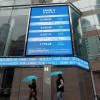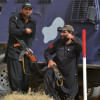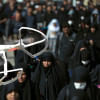Saudi-Iran spat incites sectarianism
The Arab Spring had deeply destabilised the Middle East. A new dimension was added to the existing instability on January 4, 2016, when the (Sunni) Kingdom of Saudi Arabia (KSA) severed diplomatic ties with (Shia) Iran.
The Saudi decision came following the burning of the Saudi embassy in Tehran on January 3. Iranian demonstrators attacked the Saudi mission following the execution of Shia cleric Sheikh Nimr Baqir al-Nimr (57) in Saudi Arabia on January 2, 2016. Al-Nimr, a powerful critic of the Saudi Royal family, was in jail for the past three years on charges of terrorism and anti-state activities. He was executed along with 46 Al Qaeda members.
Here two things need to be noted. First, Saudi Arabia is within its rights to execute offenders as it is the internal affair of the country. Second, by not protecting the Saudi Embassy in Tehran, Iran violated the Vienna Convention on Diplomatic Relations. It is a solemn responsibility of a country to protect foreign diplomatic missions.
Riyadh was quite aware of the repercussions and reactions of the Shia population of Iran and the region that would stem from the execution of al-Nimr, and yet they went ahead with it. On the other hand, the Iranian government failed to stop zealots from attacking the Saudi mission. Both are culpable to an extent for their behaviour. The execution fuelled sectarianism and outraged Shia communities across the Middle East.
Actually ever since Iran's revolution in 1979, its relations with Saudi Arabia have been one of antagonism. Both the countries, rich in oil resources, have been vying for predominance over the Middle East. That rivalry has now come to a head.
President Hassan Rouhani, instead of condemning the burning of the embassy, said it was "unjustified". He, however, did not take any retaliatory step. The Iranian police have arrested 40 protestors for the embassy attack. Tehran, however, formally apologised to the United Nations for the attack on Saudi embassy.
Riyadh has used the burning of its embassy to garner support from the Gulf Cooperation Council and the Arab League. Expressing solidarity with Riyadh, Bahrain and Sudan cut off relations with Tehran. Kuwait recalled its ambassador from Tehran, while the UAE downgraded its embassy. Egypt, Jordan and Tunisia issued carefully worded condemnation. Ankara and Algiers took a rather neutral position. However, the Arab world is divided.
There are two factors that weigh on the Saudi Royal family for the way they see regional developments. First, it seems like the House of Saud suffers from a sense of insecurity and is desperate to eliminate dissidents. The internal challenge is probably more serious than external threats. ISIL and Al Qaeda are already operating in KSA and there have been several ISIL-led attacks on Shia targets in the kingdom during 2015, which left several dead. It is estimated that more than 7,000 young Saudis, educated in Sunni Wahabi ideology, have joined ISIL. These trained fighters returning to Saudi Arabia is a source of serious internal threat. Besides, the growing number of restive young people in the kingdom, who are educated but do not have proper employment or any legitimate political outlet for grievances, may eventually be radicalised and pose a serious threat to the royal family.
The other internal threat to Riyadh is the plummeting oil revenue which endangers the kingdom's economy. In 2015, the Saudi budget ran a deficit of $98 billion and cut the budget by $86 billion. Budgetary cuts will directly affect welfare spending that could trigger resentment. The war on Yemen and funding anti-Assad forces in Syria are likely to put a strain on the kingdom's finances that the royal family may find difficult to overcome.
Second, there are reports of power struggle within the palace to replace the ageing king. King Salman bin Abdulaziz Al Saud (80) ascended the throne in January 2015. He had a stroke and his health is fast deteriorating. He is believed to have delegated powers to his nephew Mohammed bin Nayef (57), the crown prince and Minister of Interior; and son Mohammed bin Salman Al Saud (30), the deputy crown prince (DCP) and defence minister.
These two young Turks are the real force behind the dramatic change in Saudi foreign policy. The inexperienced DCP is believed to be a hardliner, and the stability of the kingdom will depend largely on how he behaves. A German intelligence report last year portrayed the DCP as a political gambler, who is 'destabilising' the Arab world. Saudi Arabia has become "an unpredictable wild card", it said.
Externally, though the DCP has rejected any possibility of war with Iran, the threat perception exists. Iran's nuclear deal with P5+1 has been a major source of Saudi resentment against the US. The arrest of 10 US sailors on January 12, 2016 by Iran in the Persian Gulf and their release the next day speaks of US-Iran rapprochement. Riyadh sees Washington's approach towards Iran with suspicion.
Earlier on December 15, 2015, the DCP had announced the creation of the Islamic Military Alliance of 34 countries to fight terrorism. The DCP said that the alliance, made up of Sunni majority countries, was directed not only against ISIL but also against any other terrorist organisation. The alliance does not include Iran, Iraq, Syria, Afghanistan, Algeria, Oman and Eritrea. Though the alliance has not yet taken any definite shape, one suspects that it is also directed against Iran. The German report says that the DCP is buttressing his domestic power by appealing to Sunni sectarian nationalism.
The Saudi-Iran spat comes with serious concerns. The Vienna talks over Syria, which are scheduled for January 25, may be jeopardised. Saudi-Iran cooperation is crucial for peace in Syria. Proxy wars in Yemen, Syria, Iraq and Libya will be reinforced by both countries which may destabilise the situation, further sending oil prices skyrocketing.
Neither Saudi Arabia, custodian of Islam's two holiest sites, nor Iran can be the leader of Islamic nations by stoking sectarianism.
The writer is former ambassador and secretary.

 For all latest news, follow The Daily Star's Google News channel.
For all latest news, follow The Daily Star's Google News channel. 








Comments